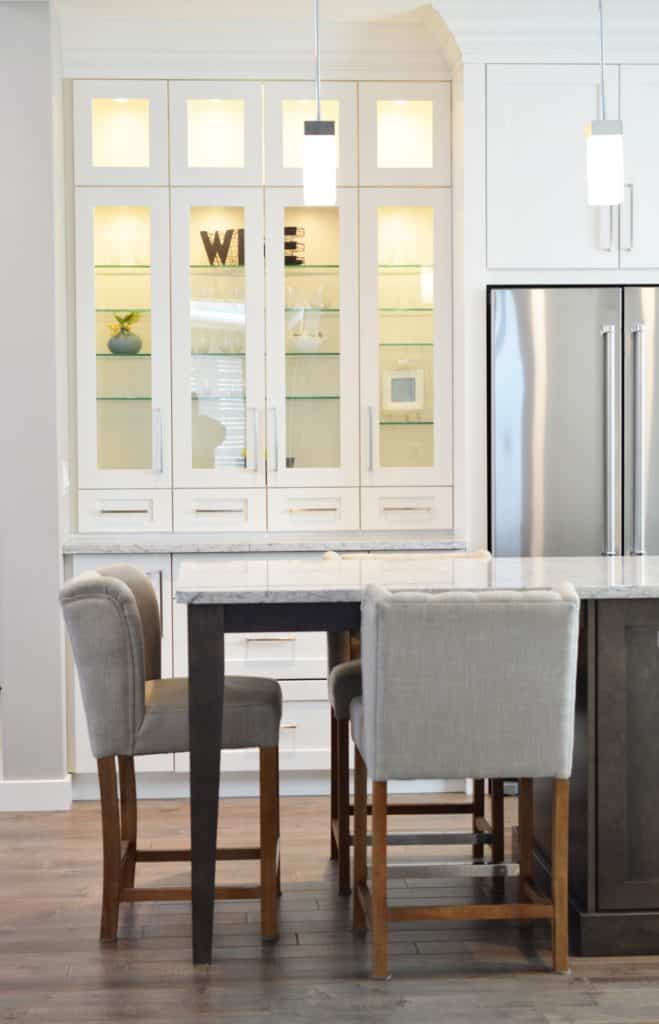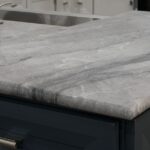Granite countertops are one of the best countertop materials out there. They’re extremely strong and durable, making them a great fit for any kitchen and bathroom. But if you’re already bored by the black-and-gray grainy texture, you might want to consider going for white granite countertops.
White granite countertops are an underrated marvel. This non-standard coloration can give a unique look for your home, and some of the textures out there may even pass for marble. However, they’re still as strong and durable as any other granite, making them a much better option than marble.
So, if you’re considering getting white granite countertops for your home, there are some things you should bear in mind, which we’ll talk about in this article.
Looking for more information on granite countertops? Then check out our definitive guide on granite countertops to find everything you need!
A Short Guide To White Granite Countertops
Granite is a beautiful mess of many different kinds of rocks and crystals. That mixture formed a long time ago and got tightly compressed and heated throughout the years, effectively gluing them together to form granite, as well as other related rocks.
What gives granite its usual grainy color is that mixture of many differently colored rocks. You’ll have minerals such as quartz, feldspar, biotite, muscovite and amphibole, each contributing with its own specific color.
The usual black-and-gray granite usually has a greater proportion of amphibole, which has a dark green, almost black coloration, as well as biotite, which ranges from black to dark brown. Quartz and feldspar are the white colored dots, being typically present in lower quantities.
With white granite, though, that’s much different. Quartz and feldspar are much more prominent, with quartz being responsible for the milky white coloration, while feldspar tends more towards an off-white. The black dots and veins it tends to have come from the biottite and amphibole.
If you think that white granite looks a lot like white quartz or white quartzite, now you know why.
Muscovite is also present in both, but often not very noticeable. It has a gold or yellow color, and you can find it more prominently in gold granite.
Advantages
The main advantages of white granite countertops is that they’re white, and they’re made of granite.
When people think of a white stone, they normally think of marble. While marble is undoubtedly a beautiful stone, it’s not exactly very practical for day-to-day use, unless you’re fine with spending a lot of money on maintenance.
It’s way too soft, meaning it can get scratched easily, and way too porous, meaning it can get stained easily. So, while it’s a very beautiful stone, it’s also very easy for it to lose its beauty over time. You need to be really careful with it.
Granite, on the other hand, is much more resistant and durable. Even natural white granite countertops are not maintenance-heavy. Resealing it once a year should be enough to keep most of the stains away, and most kinds of granite can resist even knife cuts.
White granite combines the class and beauty of marble with the strength and durability of one of the best countertop materials currently available.
Disadvantages
Unfortunately, white granite countertops are not perfect, and there are some disadvantages you have to keep in mind if you’re thinking about getting one.
First off, the countertop being white means that stains will be much more easily noticeable. While it’ll be as prone to staining as any other granite countertop, any stain will be able to leave a visible mark on it. That’s because stains tend to darken the colors of the region they’re in, along with giving it a different color.
Darker-colored granite and other stones don’t have as much of a problem with that, unless the color is very noticeable, as is the case with red wine. Water stains may also be more noticeable in lighter-colored granite than darker-colored ones.
On the other hand, white granite countertops may be better able to handle etching. Etches are similar to stains, but made by strong or acidic products. Contrary to stains, etches tend to make the colors lighter, meaning they wouldn’t be as noticeable in white granite compared to darker granite.
Another disadvantage is that white quartz can work better as a substitute for marble. White quartz tends to be much whiter than white granite, features marble-like veins, and is also much harder and more durable than granite. So they’re a though competitor in this regard.
The main disadvantage of white quartz, though, is that those features also tends to make it more expensive than white granite.

Get The Best White Granite Countertops
Have you set your mind on getting a white granite countertop? Or are you still considering other options?
Whatever you’re looking for, we can help!
If you live in or near Sarasota, FL, come visit our showroom and see what we have to offer.
You can also get in contact to us to get a free estimate from one of our specialists.
It’s the easiest way to get a high-quality countertop!



